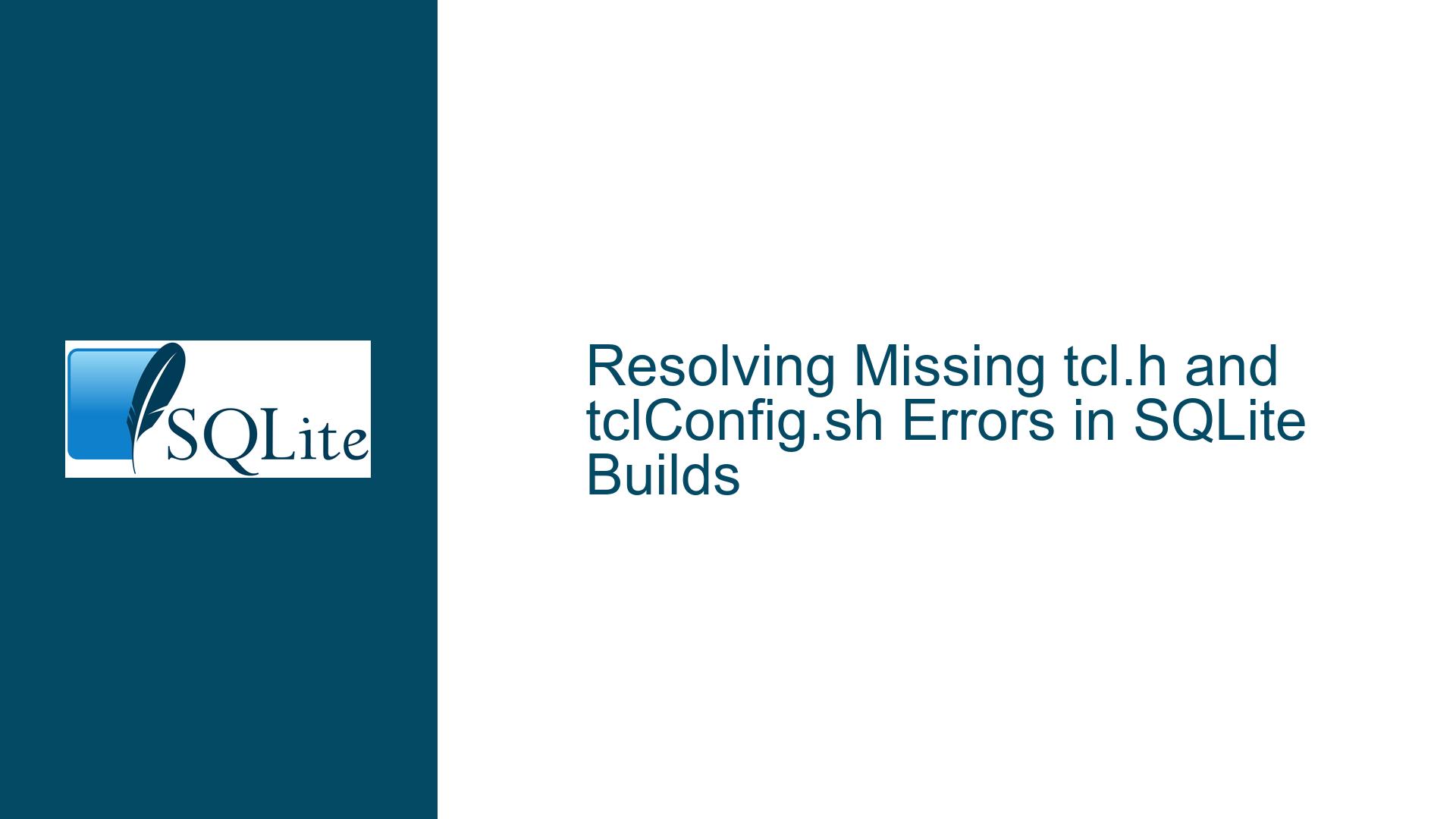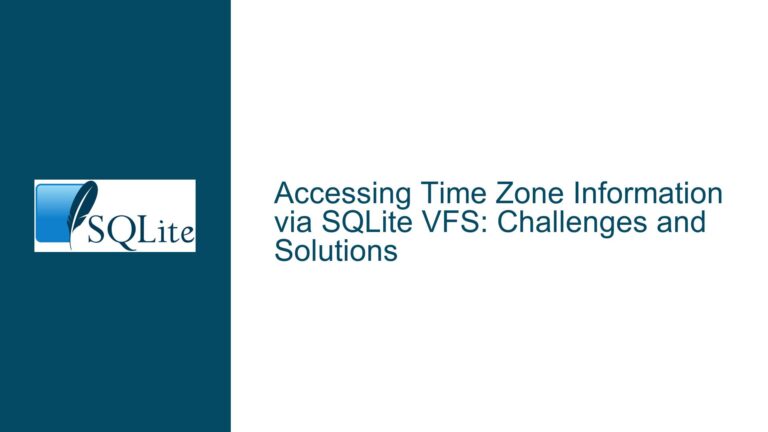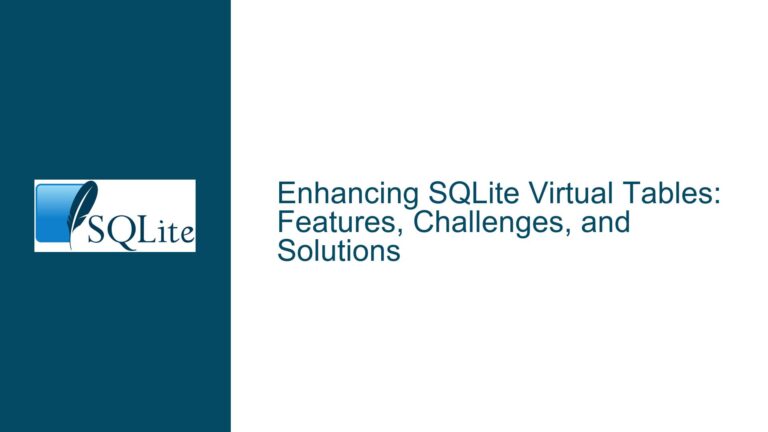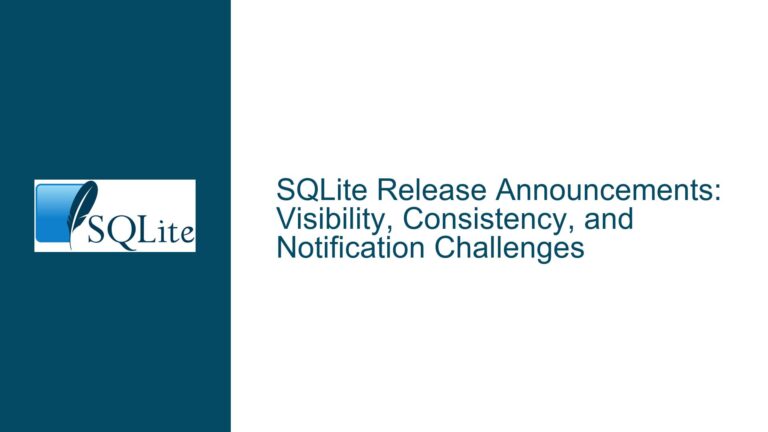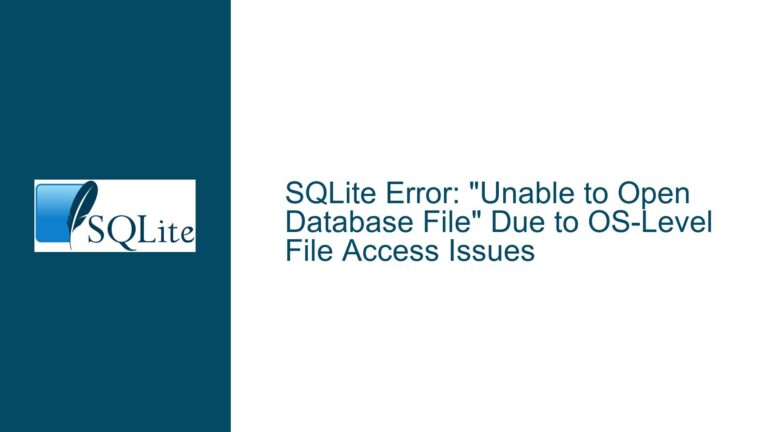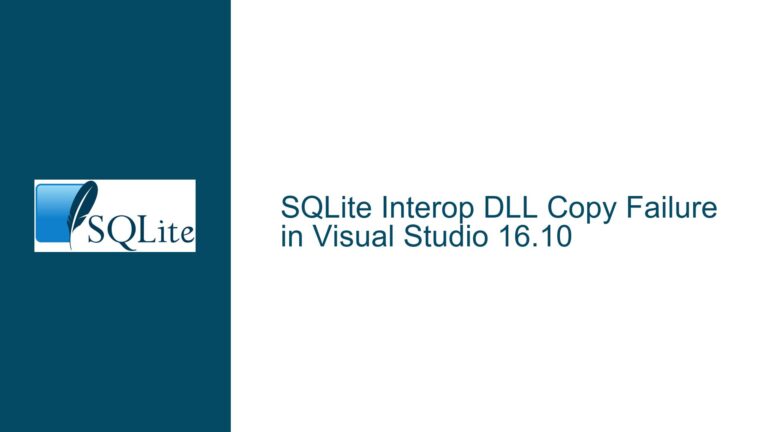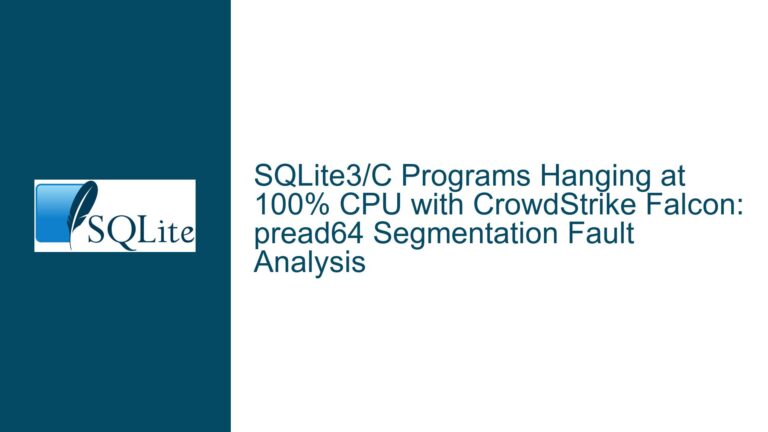Resolving Missing tcl.h and tclConfig.sh Errors in SQLite Builds
Missing tcl.h Header and tclConfig.sh in SQLite Build Process
The core issue involves compilation failures during SQLite builds when attempting to generate TCL integration components like tclsqlite3.c or tclsqlite.lo. The error manifests as a missing tcl.h header file or an inability to locate tclConfig.sh, a critical configuration script required for TCL bindings. This problem arises after recent changes to SQLite’s configure script and configure.ac logic, which altered how TCL dependencies are resolved during compilation. The failure typically occurs when building SQLite with TCL extensions enabled (e.g., for testing or TCL-based tooling) and is exacerbated when using custom installation paths like /opt/tcltk86 instead of system-default locations.
The error messages vary slightly depending on the build environment but converge on two key failures:
- Fatal compiler error:
tcl.h: No such file or directoryduring preprocessing of TCL-related source files. - Configure-time failure:
cannot find a usable tclConfig.sh file, often accompanied by warnings about the absence of TCL development artifacts in standard library paths.
These errors indicate a breakdown in the build system’s ability to locate TCL’s development headers (.h) and configuration metadata (tclConfig.sh). The absence of these resources prevents SQLite from generating TCL bindings, even though TCL is not required for SQLite’s core functionality. The problem is particularly acute in environments where TCL development packages were not explicitly installed or where TCL is deployed to non-standard directories.
Root Causes of TCL Dependency Resolution Failures
Incomplete TCL Development Environment
The most fundamental cause is the lack of TCL development headers and libraries. On Unix-like systems, runtime TCL packages (e.g., tclsh) are often separate from development files (e.g., tcl.h, tclConfig.sh). Distributions like Ubuntu split these into tcl (runtime) and tcl-dev (development) packages. Installing only the runtime component leaves the build system without access to headers and configuration scripts, triggering the observed errors. Recent SQLite changes enforce stricter dependency checks, making previously "working" setups fail if they lacked explicit TCL development packages.
Misconfigured Build Flags for Custom TCL Installations
When TCL is installed to non-standard locations (e.g., /opt/tcltk86), the SQLite configure script requires explicit guidance to locate TCL artifacts. Prior versions of SQLite may have inferred TCL paths from common conventions (e.g., appending /lib or /include to –prefix), but recent revisions removed such assumptions to avoid false positives. Failing to specify –with-tcl or –with-tclsh flags forces the build system to search default system paths, which lack the necessary files in custom installations.
Changes in SQLite’s Configure Script Logic
The SQLite build system underwent modifications to improve cross-platform compatibility and dependency resolution. These changes include:
- Removal of implicit path inference for TCL based on –prefix values.
- Enhanced validation of TCL installations via tclConfig.sh, a script that provides compiler/linker flags and version metadata.
- Stricter checks for tclsh compatibility, particularly when using non-standard TCL versions (e.g., Tcl 8.6 vs. 8.7).
These updates expose previously hidden misconfigurations, such as relying on –prefix to implicitly set TCL paths or assuming tclsh availability without verifying its development context.
Filesystem Hierarchy and Architecture Mismatches
On multi-architecture systems (e.g., x86_64 hosts with 32-bit libraries), tclConfig.sh might reside in architecture-specific subdirectories like /usr/lib/x86_64-linux-gnu. The SQLite configure script searches a limited set of paths for this file and may fail to detect it if the TCL installation uses non-standard directory layouts. Similarly, mixed installations (e.g., TCL 8.6 headers with TCL 8.5 tclsh) can confuse the build system.
Troubleshooting Missing TCL Dependencies in SQLite Builds
Step 1: Verify TCL Development Package Installation
Begin by confirming the presence of TCL development files. On Debian/Ubuntu systems:
dpkg -l | grep tcl-dev
If no tcl-dev package is installed, acquire it using:
sudo apt-get install tcl-dev
For Red Hat/CentOS systems, the equivalent package is tcl-devel:
sudo yum install tcl-devel
After installation, validate that tcl.h exists in /usr/include or /usr/local/include. If using a custom TCL installation (e.g., /opt/tcltk86), ensure include/tcl.h and lib/tclConfig.sh are present under the prefix directory.
Step 2: Specify TCL Paths Explicitly in Configure
When using a non-standard TCL installation, provide explicit paths to configure:
./configure \
--prefix=/opt/tcltk86 \
--with-tcl=/opt/tcltk86/lib \
--with-tclsh=/opt/tcltk86/bin/tclsh8.6 \
--enable-fts5 --enable-json1
- –with-tcl: Points to the directory containing tclConfig.sh. This is typically the lib subdirectory of the TCL installation.
- –with-tclsh: Specifies the full path to the tclsh executable matching the TCL version used for development headers.
If tclConfig.sh is in a non-standard subdirectory (e.g., /opt/tcltk86/lib/tcl8.6), adjust –with-tcl accordingly.
Step 3: Diagnose tclConfig.sh Detection Issues
The configure script relies on tclConfig.sh to determine compiler flags and library paths. If this script is missing or unreadable, SQLite cannot build TCL bindings. To diagnose:
find /opt/tcltk86 -name tclConfig.sh
If the file is missing, reinstall TCL development packages or rebuild TCL from source with –enable-symbols and –enable-shared flags. If it exists but isn’t detected, manually verify its permissions and content:
ls -l /opt/tcltk86/lib/tclConfig.sh
cat /opt/tcltk86/lib/tclConfig.sh | grep "TCL_VERSION"
Ensure the script defines variables like TCL_VERSION, TCL_INCLUDE_SPEC, and TCL_LIB_SPEC.
Step 4: Adjust Library Search Paths for Multi-Arch Systems
On systems with multi-arch support (e.g., Debian’s x86_64-linux-gnu), tclConfig.sh might reside in architecture-specific directories. If SQLite’s configure cannot detect this, extend the search path using environment variables:
export CPATH=/usr/include/x86_64-linux-gnu:/opt/tcltk86/include
export LIBRARY_PATH=/usr/lib/x86_64-linux-gnu:/opt/tcltk86/lib
./configure --with-tcl=/usr/lib/x86_64-linux-gnu
This informs the compiler and linker where to locate headers and libraries outside standard paths.
Step 5: Rebuild and Validate TCL Bindings
After addressing path and dependency issues, rebuild SQLite’s TCL components:
make clean
make tclsqlite3.c
Monitor the output for TCL-related warnings. Successful builds will generate tclsqlite3.c and tclsqlite.lo without errors. Validate the integration by running make test and checking for TCL-specific test failures.
Step 6: Update Build Scripts and Documentation
If the build process is part of a CI/CD pipeline (e.g., GitLab CI), update the pipeline configuration to include TCL development packages and explicit configure flags. For example, in a .gitlab-ci.yml file:
before_script:
- apt-get update && apt-get install -y tcl-dev
script:
- ./configure --with-tcl=/usr/lib/x86_64-linux-gnu --enable-fts5
- make
Step 7: Handle Version Conflicts and Legacy Systems
Older systems may ship with outdated TCL versions (e.g., Tcl 8.5) that lack features required by modern SQLite builds. In such cases, compile TCL from source and install it to a custom prefix:
wget https://prdownloads.sourceforge.net/tcl/tcl8.6.13-src.tar.gz
tar xvfz tcl8.6.13-src.tar.gz
cd tcl8.6.13/unix
./configure --prefix=/opt/tcltk86 --enable-shared
make && sudo make install
Then reference this installation when building SQLite:
./configure --with-tcl=/opt/tcltk86/lib --with-tclsh=/opt/tcltk86/bin/tclsh8.6
Step 8: Debug Autoconf and Makefile Logic
For advanced users, inspect SQLite’s configure script to understand how TCL detection works. Search for lines referencing tclConfig.sh or tcl.h:
grep "tclConfig.sh" configure
This reveals the script’s search logic, helping identify why a valid tclConfig.sh isn’t detected. Similarly, review Makefile rules for tclsqlite3.c to ensure dependencies are correctly specified.
By systematically addressing TCL’s header visibility, configuration script detection, and build flag accuracy, users can resolve the tcl.h and tclConfig.sh errors while adapting to SQLite’s stricter dependency checks.
